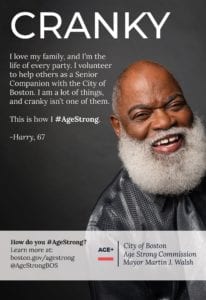Who is a member?
Our members are the local governments of Massachusetts and their elected and appointed leadership.
Mass Innovations, From The Beacon, November 2019

Harry Pierre, 67, gets the spotlight as one of eight older Boston residents featured in a public awareness campaign to combat ageist stereotypes.
With the help of eight resilient residents, the city of Boston is working to shatter assumptions about older people and reshape the discussion around aging well beyond its borders.
On Sept. 24, the city unveiled its Age Strong public awareness campaign, which includes a 30-second commercial running on local cable and print and digital ads appearing around the city. The commercial features eight residents, ages 59 to 103, knocking down ageist stereotypes – labels such as frail, cranky or senile.
City officials believe the anti-ageism campaign is the first of its kind in the nation; three weeks after Boston announced its effort, San Francisco launched its Reframing Aging initiative.
For Boston, the new campaign is part of a larger reframing effort. In January, the city renamed its Commission on Affairs of the Elderly, calling it the Age Strong Commission. The broader Age Strong campaign is another way to reframe the concept of aging, said Boston Age Strong Commissioner Emily Shea.
“I feel like there’s some momentum here,” Shea said. “We really need to change this conversation.”
The public awareness campaign grew out of 30 listening sessions the city held with older residents in 2015, and from the development of Boston’s Age-Friendly Action Plan, the city’s blueprint for helping residents age successfully in their community. The action plan contains 75 to-do items, one of which is combating ageism.
According to 2017 population estimates, Boston has more than 186,000 residents age 50 and older, making up 27 percent of the city’s population. Shea said that aging stereotypes end up limiting services that older residents receive.
“If policies are made with that mindset, you may not be looking at the full picture,” Shea said.
The Age Strong video is already running on local cable, and print ads can be found at City Hall, the main Boston Public Library and library branches, and in bus shelters. The city is also working with Massport to display digital ads at Logan Airport.
The project cost about $13,000, which paid a photographer and about $8,000 for printing, including the advertisements and Age Strong bookmarks being distributed at libraries, Shea said.
The commission already knew some of the residents chosen as models for the campaign and went looking for others to ensure a diverse range of voices and counterpoints to ageist stereotypes.
“We wanted to make sure we picked Boston residents who reflected our community, but we also wanted to find stories that were universal,” said Cassandra Baptista, Age Strong’s communications director.
She said she hopes the effort will widen the campaign’s appeal beyond Boston.
The Boston campaign fits into a wider context of changing the language around aging and senior services. The town of Barnstable, for instance, recently dropped the word “senior” from its senior center to become the Barnstable Adult Community Center, and its services have been evolving with the needs of its constituents.
Many communities, however, lack Boston’s ability to launch a campaign of this scale. Recognizing this challenge, the city is working with UMass Boston to create a discussion guide and has offered to share its materials so other communities can add their own logos and use them locally.
“We want to spread the message as far as we can,” Shea said.
To see the “I’m Aging Strong” video and to learn more about the campaign, visit tinyurl.com/BostonAgeStrong. From that page, officials from other communities interested in participating can click on the “Partner with Us” link to send a request to the commission.